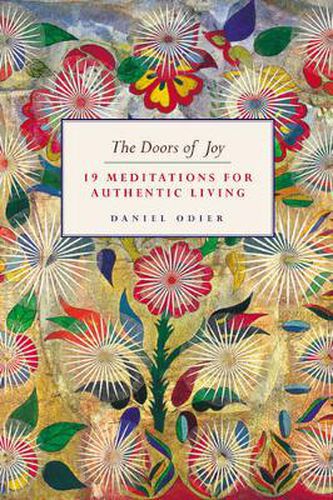Readings Newsletter
Become a Readings Member to make your shopping experience even easier.
Sign in or sign up for free!
You’re not far away from qualifying for FREE standard shipping within Australia
You’ve qualified for FREE standard shipping within Australia
The cart is loading…






In The Doors of Joy, Daniel Odier takes us on a journey of self-discovery in unique and sublime style. Joy, he argues, occupies a central place in our search for the absolute. It cannot be compared to pleasure or happiness, which depend on external circumstances and are ephemeral. Joy is at the heart of any search, and, at the same time, it is the clearest sign that individuals have reached the harmony that they seek to derive from their philosophical, artistic and spiritual practices.
Odier’s quest to find spontaneity, joy and freedom began at the age of 15, when he first discovered Zen through the monumental writings of D.T. Suzuki. Via the philosophies of Dzogchen, Vajrayana and the Shaivism of Kashmir, Odier then returned to Zen and the old Chinese masters of the Tang dynasty, which has had extensive influence on and permeates his writings. In The Doors of Joy, Odier observes the connection between the Tang dynasty and the human necessity to escape our limitations. He discusses our propensity to build systems around our ideas in an attempt to give more value to our knowledge and experience, when, in actuality, we are building conceptual limitations. The Doors of Joy proposes that, by using and then forgetting the teachings from the past, we can reach an authentic kind of freedom.
$9.00 standard shipping within Australia
FREE standard shipping within Australia for orders over $100.00
Express & International shipping calculated at checkout
In The Doors of Joy, Daniel Odier takes us on a journey of self-discovery in unique and sublime style. Joy, he argues, occupies a central place in our search for the absolute. It cannot be compared to pleasure or happiness, which depend on external circumstances and are ephemeral. Joy is at the heart of any search, and, at the same time, it is the clearest sign that individuals have reached the harmony that they seek to derive from their philosophical, artistic and spiritual practices.
Odier’s quest to find spontaneity, joy and freedom began at the age of 15, when he first discovered Zen through the monumental writings of D.T. Suzuki. Via the philosophies of Dzogchen, Vajrayana and the Shaivism of Kashmir, Odier then returned to Zen and the old Chinese masters of the Tang dynasty, which has had extensive influence on and permeates his writings. In The Doors of Joy, Odier observes the connection between the Tang dynasty and the human necessity to escape our limitations. He discusses our propensity to build systems around our ideas in an attempt to give more value to our knowledge and experience, when, in actuality, we are building conceptual limitations. The Doors of Joy proposes that, by using and then forgetting the teachings from the past, we can reach an authentic kind of freedom.